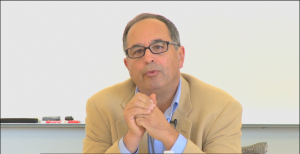According to the recently released African Economic Outlook, the number of youths in Africa is set to double by 2045. This ‘youth bulge’ typically carries negative associations, as frustrated young men for example become easy recruits for violent entrepreneurs. But what are the other manifestations of Africa’s emerging generation shift? What are the other attitudinal distinctions between citizens and leaders — youths and elders — with regard to economics, politics, and history? How do young Africans in the US confront negative stereotypes of the continent, while also describing the often bleak political realities back home? At an event called “Young Voices and New Visions from Africa,” I posed these and other questions to a panel of students, young bloggers, and activists at the Institute for Policy Studies (IPS) in Washington, where I am an Associate Fellow. (The panelists all spoke strictly as individuals and not on behalf of any organization.)
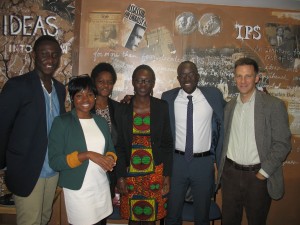
LEFT – RIGHT: Michael Appau, a native of Ghana studying at Georgetown University; Jumoke Balogun, a Nigerian-American co-founder of CompareAfrique.com and public relations expert at the Service Employee’s International Union; Estelle Bougna Fomeju, a Cameroonian student at Sciences Po in Paris; Mame-Khady Diouf a Senegalese working in the Africa Program at the Woodrow Wilson Center; Kizito Byenkya, a Ugandan working at the Open Society Institute, and co-publisher of the blog, CompareAfrique.com. And me.
One motivation for organizing this event stems from my experience last summer at the University of Nairobi, where I co-led the American Political Science Association’s (APSA) Africa Workshop. At several points during the two week seminar, scholars described a major generational shift among African scholars. The old generation trained in the US and stayed. They continue to be influential but are disconnected – from events in Africa and from a newer generation on the continent, said my colleagues. Second, I described how empowered I felt in 1991 when I was invited to the IPS for the first time to discuss student opposition to the Gulf War. (For some reason, the Vietnam War movement remains the standard image of anti-war activism, even though my generation organized a quarter of a million people in the streets of DC against a war before a single body bag came home.) Third, last month at the Congressional Black Caucus Africa Braintrust at the Annual Legislative Conference, I listened as a student asked the panel – which included Assistant Secretary of State for Africa Carson – how much hypocrisy she can expect from the politicians when she returns to Africa, armed with her Western education.
Positive Images of Africa
There is a push within the Africanist community to project a positive image of Africa. On the one hand, this is necessary in order to confront stereotypes or ignorance about the continent. But does this interfere with honest assessments about current conditions in Africa? In posing this question, I had in mind the controversy surrounding the Sullivan Foundation’s conference in Equatorial Guinea, and also the work of leaders such as Andrew Young in drawing private investment to dubious democracies such as Rwanda’s. Just a few days before the panel, Amnesty International reported on torture and official abuses in Rwanda. But I also had in mind my own experience in attending roughly half of the CBC Annual Conferences over the last two decades, and watching the topics shift from civil rights and progressive political reform, to an environment that sometimes feels like a trade fair. Do some young people take those struggles for granted and see Africa simply as “the next big market,” or a place for making a buck? Finally, the generation gap is visible for example in the African National Congress. As the generation that defeated apartheid ages; it is interesting though, that the radicals once again appear to be the youths.
Click here to download the first of three short MP3 audio files of the event.
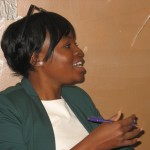
Jumoke discussing the ghosts of Biafra
Mame-Khady started off this response reflecting on the problem of positive images. Jumoke then talked about Biafra’s atavisms among the Igbo in Nigeria. While the elders look at troubles today and might say – let the north go – a younger generation often finds such talk irrational. Kizito then related the generation gap to Uganda’s politics; it’s hard to vote against Museveni today, remembering how hard it was in the years before the NRM arrived. Why jeopardize two decades of peace?
The Politics of the Generation Gap
The generation gap is perhaps especially pronounced given the esteem ascribed to elders in most African cultures. The phrase “youth bulge” is evoked in think tank studies about civic conflict or electoral violence in Africa. So I asked the panel, Is this perception unfairly negative? How does the generation gap really manifest itself attitudinally? With this, I also had in mind my own introduction to Nigeria in 1999, where I was constantly reminded that more than half of the citizens at the time had never experienced democracy. This generated very high, often unrealistic expectations about government performance, and this can be dangerous. So what does the “Third Wave generation” think of the regional context of democratization today?
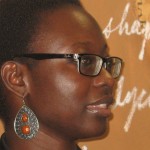
Mame-Khady responds.
Mame-Khady argued that in terms of the generation gap, she has her views, but she does not yet have a “seat at the table.” Jumoke countered, they (the older generation) has been at the table for 50 years in Nigeria – she wants them out of the table. They’ve done nothing and you can’t name a country that’s working. This part of the conversation highlights this debate. Estelle then interjected to point out that many people aren’t even voting anymore because no one expects a turnover until President Biya dies; there’s no meaningful participation anymore in Cameroon.
I then discussed how there is a temptation to romanticize youth, since they have been at the vanguard of so many great social movements. Afrobarometer surveys in 19 countries however released last year – at the height of the Arab spring – should give us pause though:
- In comparison with older citizens, Africa’s youth tend to vote less.
- They express a lower level of partisanship, consistent with findings for the youth in other regions of the world.
- However, Africa’s youth are not more likely to protest than older citizens. Even though they very often question the credibility of elections, youths are not very likely to turn to the street to convey their political preferences, or to demand reforms for such problems.
Ignore the obvious for a moment: many elections are not credible. Do African politicians neglect the youth vote? It would seem there is a huge constituency for them. The key question for the panel was, Absent the ballot box, how will African youths have their views heard?
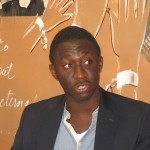 Michael pointed out that the last time people picked up guns, democracy and a lot of hope was lost after independence in Ghana and beyond. These lessons have been learned. Click here to download the second audio file and hear the searching discussion that resulted.
Michael pointed out that the last time people picked up guns, democracy and a lot of hope was lost after independence in Ghana and beyond. These lessons have been learned. Click here to download the second audio file and hear the searching discussion that resulted.
The Third Wave Generation at Home and Abroad
The South African poet, Arthur Nortje, wrote “Origins trouble the voyager much, those roots that have sipped the waters of another continent.” These were his reflections on exile. For many Africans here in the US, they are here for different reasons. Unlike their parents perhaps, they are less likely to have fled a dictator. The led to me asking the panel, Does anyone question your standing – your right – to criticize the government back home? Either because you’ve been gone long, or because you somehow haven’t “suffered” enough?
Women
Ellen Johnson Sirleaf and other African women receive a lot of attention. I then noted that a recent report by Search for Common Ground about “Youth to Youth” engagement in Liberia states “While older women are increasingly holding positions of power, young women continue to be much more hesitant to engage in politics than their male counterparts. Female youth carry the additional burden of child rearing and suffer the brunt of sexual‐ and gender‐ based violence.” The report also describes how young men feel unprepared to cope with these dimensions of social change.
Do we have an incomplete picture of the changing role of women that marginalize the experience of young women? Where do men fit in to this image of the new African woman?
Click here to download the third audio file to hear responses from Michael, Estelle, and the other panelists on this issue and regarding the role of women.
Neither Here Nor There?
The Ethiopian novelist Dinaw Mengistu just won a “genius award” from the MacArthur Foundation. The National Book Foundation had previously named him a “5 under 35,” as a up and coming author. In his book, The Beautiful Things that Heaven Bears, he reflects upon gentrification in Logan Circle in DC – just a few blocks from IPS. Racial tensions escalate between the white newcomer(s), and African-Americans old timers. The main character, an African immigrant owner of a convenience store, struggles to build cultural bridges from the neighborhood to his white friend. His failures become part of his alienation. So I asked the panel, We want to believe in multi-culturalism. But are there moments of cultural isolationism, where you are neither here nor there? If so, how does a young member of the diaspora cope?
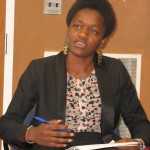
Estelle responds.
The Demographics of Development
The 2012 African Economic Outlook reported that about 60% of the continent’s unemployed are aged 15 to 24 – and more than half of these, many women, have given up on finding work. In response, the director of the African Development Bank in May commented “The continent is experiencing jobless growth.” There is a gender component to this question, because fertility rates and development rates are inextricably linked. The best information about family planning, from the United Nations, suggests great variation across the continent:
- In North Africa 50 percent of the women use some method of contraception. But in east Africa it is only 26 percent, and it West Africa it is only 14.5 percent.
- In North Africa, only 10 percent of women report an unmet need for family planning. In east Africa, nearly 28 percent do.
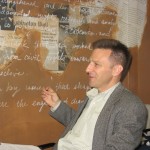 I was hoping to get at the relationship between population growth and development, but after asking a rather personal question, the panel took a slightly different direction. How big do you want your family to be? And how big does your father want your family to be?
I was hoping to get at the relationship between population growth and development, but after asking a rather personal question, the panel took a slightly different direction. How big do you want your family to be? And how big does your father want your family to be?
The third audio file covers these responses, including a few chuckles about this personal question. Thanks for your honest answers. And congratulations on an amazing conversation!
 enables them to be so accurate – seeing people up close – also makes the kills personal, which is disturbing of course when unarmed children end up the victims.
enables them to be so accurate – seeing people up close – also makes the kills personal, which is disturbing of course when unarmed children end up the victims.
